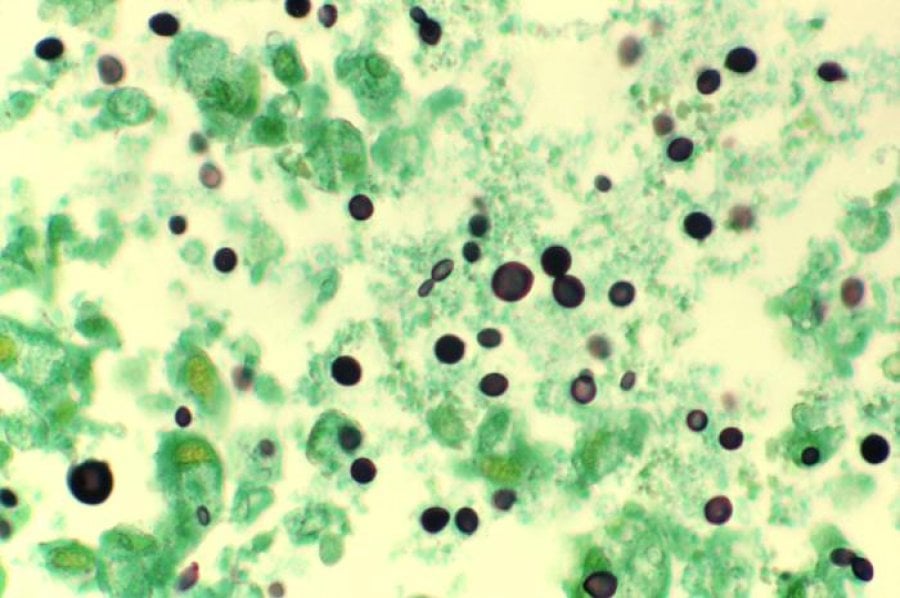£1.9m grant to improve diagnosis and treatment of meningitis in Africa
13 August 2018 London School of Hygiene & Tropical Medicine London School of Hygiene & Tropical Medicine https://lshtm.ac.uk/themes/custom/lshtm/images/lshtm-logo-black.png
Caption: Lung tissue specimen from AIDS patient with cryptococcosis. Caption: CDC Public Health Image Library
Professor Joe Jarvis from the London School of Hygiene & Tropical Medicine (LSHTM) has been awarded a Global Health Professorship from the National Institute of Health Research, Trainees Coordinating Centre, to lead new research into Central Nervous System (CNS) infections in Africa.
Awarded for the first time this year, Professor Jarvis is one of just two people to receive a Global Health Professorship, which aims to accelerate the transfer of research ideas to deliver better health in low and middle-income countries (LMICs). Over a 5-year period, the research will look to improve the management of meningitis in HIV-positive African adults.
In Africa, up to 200,000 people are estimated to die every year from just one form of meningitis called cryptococcal meningitis (CM). Overall, CNS infections - which include meningitis and other infections of the brain, are responsible for up to 30% of all deaths in HIV-infected individuals.
The work will be based on a series of clinical studies and a large trial of new CM treatment in Botswana, South Africa, Zimbabwe, Malawi, and Uganda.
Joe Jarvis, Professor of Tropical Medicine and International Health at LSHTM, said: “I am delighted to receive this funding from the National Institute of Health Research and be awarded a Global Health Professorship.
“CNS infections are extremely difficult to diagnose and treat; even in resource-rich settings they cause high rates of death and disability. In low and middle-income countries these infections are particularly common - especially in regions with high rates of HIV infection.”
HIV-positive individuals are at increased risk from a wide range of CNS infections and they often develop extremely severe illness. The highest rates of HIV are seen in east and southern Africa, and in these regions meningitis and other brain infections are a leading cause of death.
It is not currently known exactly what infections are responsible for much of the meningitis in African patients, so targeted treatment is not possible. Among patients diagnosed with CNS infections in LMICs, over half still die, so improvements to current treatments are desperately needed.
To address current problems in diagnosing and treating CNS infections in Africa, Professor Jarvis’s research will focus on four key areas.
- Collecting information on all patients being tested for meningitis at an African hospital, running detailed testing to determine the causes of infections
- Evaluating new tests for meningitis which can detect many different infections at once, diagnosing patients at the bedside
- Assessing a new treatment for CM, the most common cause of meningitis, using an existing drug called liposomal amphotericin
- Performing detailed examinations of patients’ immune responses and genetic make up to establish why some develop CM and some do not, along with finding out what factors are associated with death from CM
The findings will allow treatment guidelines for meningitis to be updated based on accurate data about the causes of meningitis. This combined with a better understanding the underlying reasons and pathology of why some people are predisposed to CNS infections and subsequent death, could lead to new treatments and prevention strategies, significantly reducing mortality from CNS infections.
Professor Jarvis added: “This vital research will provide a better understanding of the body’s response to CNS infections, and help identify risk factors for disease development and death in HIV-positive individuals.
“Our work will look to develop entirely novel treatment and prevention strategies for CNS infections. Finding an effective new treatment for CM that is easy to administer in African hospitals would save thousands of lives each year.”
If you enjoyed this article and would like to build a career in global health, we offer a range of MSc programmes covering health and data, infectious and tropical diseases, population health, and public health and policy.
Available on campus or online, including flexible study that works around your work and home life, be part of a global community at the UK's no.1 public health university.